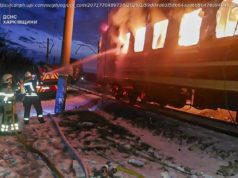Hurricane Michael battered inland rural communities with such force that it stunned residents and left them with a daunting recovery they didn’t expect.
MARIANNA, Fla. — After carving a path of despair along the coast of Florida’s Panhandle, Hurricane Michael drubbed the state’s inland rural communities with such unexpected brutal force that it left residents and officials stunned — and facing a daunting recovery.
That a ferocious storm could blast north from the Gulf of Mexico and through a battery of states before it finally fled to the Atlantic Ocean early on Friday was always a possibility, but not one people here thought likely.
“There’s a group of us who have been warning about this for years,” said Rodney E. Andreasen, director of emergency management for Jackson County, where Marianna is the county seat. Mr. Andreasen said the area felt sustained winds of 130 to 140 miles per hour.
By the time Michael crossed into Georgia, it was still classified as a major Category 3 hurricane with a clearly defined and devastating eye.
“We’re only 40 miles from the coast as the crow flies, and hurricanes don’t respect coastlines,” Mr. Andreasen said.
[ See the devastation of the storm in pictures.]
Hurricanes are fickle beasts, their projected paths never certain, their total destruction sometimes not known for days. The death toll continues to rise, with people killed by trees or washed away in cars in Florida, Virginia, North Carolina and Georgia.
Still, Mr. Andreasen could not have foreseen the magnitude of devastation at home: Much of the county’s road department was a pile of rubble. The sheriff’s office lost its roof. Even the generator at the emergency operations complex failed Thursday night, before another one was brought in.
“This is the worst disaster Jackson County has ever seen,” Mr. Andreasen said. Three of the 16 deaths were recorded in that county. A fourth remains under investigation, and the sheriff said his deputies continued to find people trapped inside their homes by felled trees.
The first sign of help Darryl Brunson and his brothers said they saw was on Friday, when marked police cars raced down their street, their intent unclear, and maneuvered across an obstacle course of trees. A few minutes later, heavy equipment yanked one of the huge tree trunks from the ground and hauled it away.
“Everything else we cleaned ourselves with our bare hands,” said Mr. Brunson, 27.
[ We asked readers to tell us about what the storm is costing them.]
The hurricane’s winds were so strong, Mr. Brunson said, that he did not hear a tree snap and fall in his own front yard — away from the house, luckily, and from his four children, who range in age from 1 to 6 years old.
“We didn’t figure it was going to be this bad,” he said, the storm’s remnants scattered around him: A gate that belonged in the back yard was in the front yard, as was what was left of a playhouse. A trampoline he thought he had secured tore a hole in his roof.
Now Mr. Brunson, who works at a nearby Dunkin’ Donuts, and his neighbors fear weeks without electricity — and perhaps without paychecks — as the town of Marianna and the rest of Florida’s vast rural counties struggle to return from a disaster usually associated with beachfronts. Some of them worry the shattered coast, beloved by residents and tourists alike, will draw most of the attention and dollars, leaving places like this one, with shoestring economies to begin with, unattended.
“We’re one of the largest dirt-road counties in the entire state of Florida,” said Eric Hall, a county commissioner, of the challenges of getting around after the storm.
On Lafayette Street in downtown Marianna, a corner law firm’s entire facade was blown out, exposing two floors of desks and filing cabinets inside. A well-liked restaurant looked like a box missing the front and top.
In nearby Gadsden County, where officials said at least two tornadoes touched down on Wednesday, Steve Sweet died in his wife’s arms after a tree fell on their home, his wife told reporters on Thursday. Gayle Sweet said she waited outside and refused to go to a hospital for treatment herself until his body had been taken away.
On Friday, she said in a phone interview that she was still too heartbroken to talk about her loss. “It’s been a nightmare,” she said through tears. “He was so wonderful.”
In Quincy, a line dozens of cars deep stretched into the road Friday morning from a parking lot in a prison next to a National Guard armory, where service members offered families cases of water, boxes of ready-to-eat meals and roof tarps. Shortly after the trucks pulled in, word had spread around town — in spite of the lack of power and cellphone service — that some help had arrived.
“There’s no shower. We can’t use the toilet,” said Halina Ciucci, whose home relies on well water powered by an electric pump. “We’re hoping we can find an open A. T. M. to get cash because no one is taking credit cards.”
Ms. Ciucci, who moved years ago from Fort Lauderdale after losing everything in Hurricane Wilma in 2005, experienced the storm inside a mobile home. “It was horrible,” she said. “I’m from down south and this is the worst I’ve ever been in.”
We asked readers about the costs of
Shakeria Dillard and Davaughn Wilson arrived in a van and asked for tarps for their damaged roof and anything they could get for their four children. They said they feared their power would not return for weeks.
“We’re going to have to stay,” Ms. Dillard said. “Money is limited.”
They left without what they hoped for most: ice.
The damage extended deep inside Apalachicola National Forest, where, in the outpost of Sumatra, about 25 miles from the coast, Ashley Raffield and his wife, Brandy, said they went out late Wednesday as the last of Michael’s winds passed to clear a path outside the home of Ms. Raffield’s sister, who is nine months pregnant.
“We’re just trying to find the Red Cross,” Mr. Raffield, 32, said late Thursday in Eastpoint, the nearest town on Apalachicola Bay, where the couple had found a small market open to buy baby food for their infant daughter. “To see if we could take showers or something.
Home
United States
USA — Political Far From the Shattered Coast, Hurricane Michael Packed an Unexpected Punch






